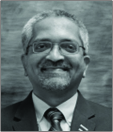Translate this page into:
Coping with COVID-19

-
Received: ,
Accepted: ,
How to cite this article: Butani D. Editorial . Am J Interv Radiol 2020;4(6):1.
Dear Colleagues,
These are challenging times for the medical professionals. I want to applaud all Interventional Radiologists on the front lines providing essential life-saving services to patients affected by the COVID 19 pandemic. I would also like to thank the unwavering dedication of the AJIR Editorial Board and the section editors for providing timely reviews and guidance to me. We want to thank our reviewers for their hard work in submitting timely reviews to support the high-quality manuscripts that we publish. Above all, we are incredibly thankful to our authors and readers for their continued support.
It is of utmost importance, more today than ever that we share any new information about COVID-19 at the earliest with our colleagues. AJIR is accepting all types of manuscripts related to COVID-19 on a priority basis. Please submit your manuscripts on this topic at the earliest.
As of the date of this article, there is the only supportive treatment for COVID 19 infection. Minimizing exposure remains the only viable public health strategy, as evidenced by global “stay at home” governmental initiatives. However, we, as practitioners of Interventional Radiology, cannot stay at a distance to perform the essential procedures; therefore, it is essential to screen every patient for COVID 19 symptoms and preferable to have laboratory tests. Aerosolizing procedures such as gastrostomy placements and lung biopsies should be performed with PPE (N95 or similar respirator, face shield, impermeable gown, and gloves).
Primary strategies to prevent contracting infection involve protecting the mucous membranes and the respiratory tract. Hand washing with soap and water for at least 30–45 s or use of alcohol- based hand sanitizer is the most effective strategy at limiting and preventing the spread.
It is vital to prevent burnout during these stressful times utilizing simple measures such as a balanced diet, adequate hydration, regular exercise, meditation, and proper rest.
While the number patients affected from COVID is staggering, the international response from the medical community in providing the best care possible for their patients, often at grave risk to personal health, need to recognized and appreciated. Physicians from different nations are quickly sharing treatment strategies and tips to reduce mortality and morbidity. I hope that this is the spark that will light the fire for global cooperation and collaboration in medicine, similar to the educational goals of AJIR.
Be safe.
Associate Editor American Journal of Interventional Radiology
associateeditor@americanjir.com






